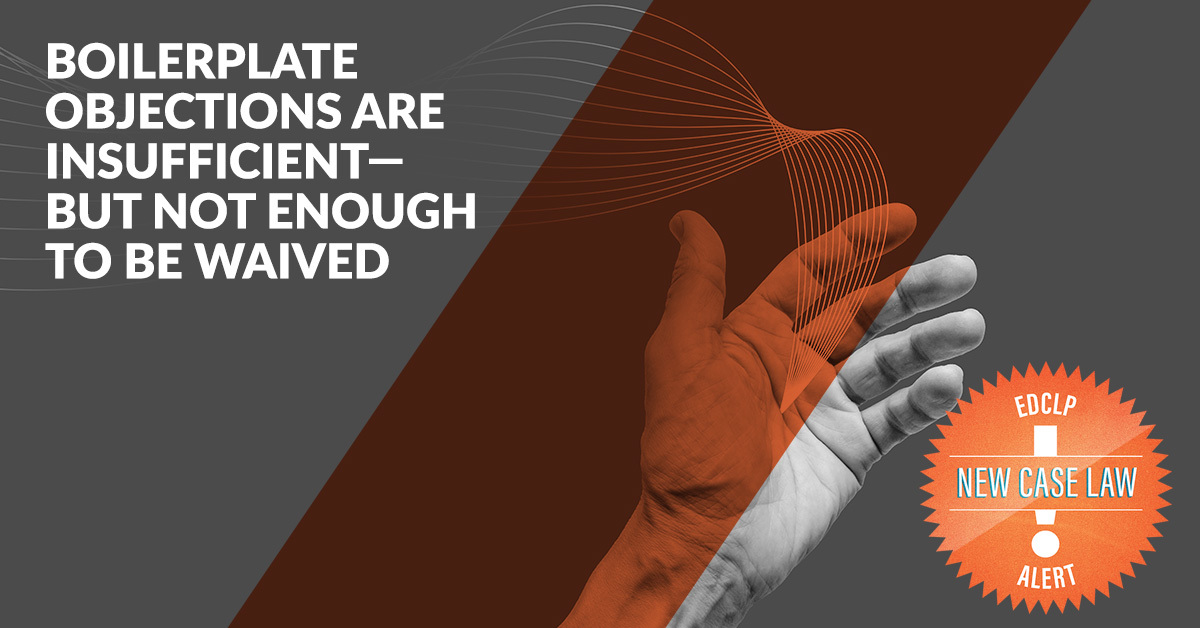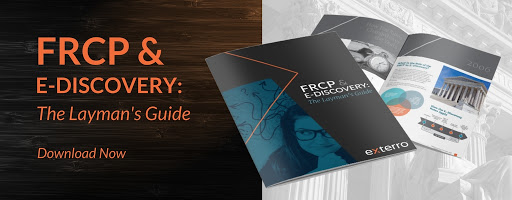E-Discovery
Case Law Alert: Boilerplate Objections Are Insufficient—But Not Enough to Be Waived
September 23, 2022

It’s long been established that boilerplate objections to discovery requests will not be allowed, but in this case Doma Title Insurance v. Avance Title, LLC the court permitted the defendants to supplement their objections rather than considering them waived.
Overview
In this case concerning allegations that a contractor to an insurance company failed to comply with all the contractual obligations it owed to its client (the plaintiff), a disagreement arose over the materials the defendant would have to produce during discovery.
In discovery, the plaintiff requested from defendant all documents and communications between defendants and any party that “concern the allegations in the complaint.” defendants responded that the requests were overly broad and disproportionate to the needs of the case, failing to offer additional detail regarding the burden the requests imposed in terms of time or cost. The defendants also responded with the same objections regarding burden and scope given in response to interrogatories and document requests.
At issue were whether 1) defendant’s objections were sufficiently specific; 2) requests for production from the defendant could be limited to specifically defined transactions; and 3) whether plaintiff’s requests for production were proportional to the case.
Ruling
While Rule 34 does not explicitly state that objections must be specific, it has long been held that boilerplate requests and objections are insufficient. The court explained, “implicit within Rule 34 is the requirement that objections to document production requests must be stated with particularity in a timely answer, and that a failure to do so may constitute a waiver of grounds not properly raised… [as] piecemeal objections to producing requested discovery… adds unnecessary expense to the parties and unjustified burden on the court.””
- Objections Deemed “Boilerplate.” The court found that the defendants’ objections in this case were “boilerplate” because Defendants objected to the contested document requests and interrogatories by simply stating that the requests were overly broad and not proportionally tailored to the needs of the case.
- Failure to Specify May Result in Waiver… Based on FRCP 33 (b)(4) and implicit in FRCP 34, the court explained that the “failure to state an objection with particularity in response to an interrogatory or a request for production of documents may result in a waiver of that objection.”
- But No Waiver in This Case. The court ultimately did not waive the defendants’ objections for two reasons. First, since the parties had agreed to an extended period for discovery, the defendants still had time to file amended objections with the required level of specificity. Second, the plaintiff’s original requests were of broad scope and did not provide reasonable limits to individuals subject to the request, subject matters of the request, or search terms that might help the defendant cull responses.

Expert Analysis from Hon. Andrew J. Peck (ret.), Senior Counsel, DLA Piper
Almost seven years ago, in December 2015, Rule 34 was amended to require that the responding party must “state with specificity the grounds for objecting,” and “the reasons” for the objection. Boilerplate objections are not allowed. Lawyers must learn to read the actual rules, not rely on what they remember from Civil Procedure in law school. Fortunately, in this instance the requests were also sufficiently broad that the court allowed a “do over.” Counsel would be wise to not rely on such a result in future cases.
Case Law Tip
Have questions on how the FRCP applies to e-discovery? Download this FRCP E-Discovery Quick Guide to get all your questions answered.
